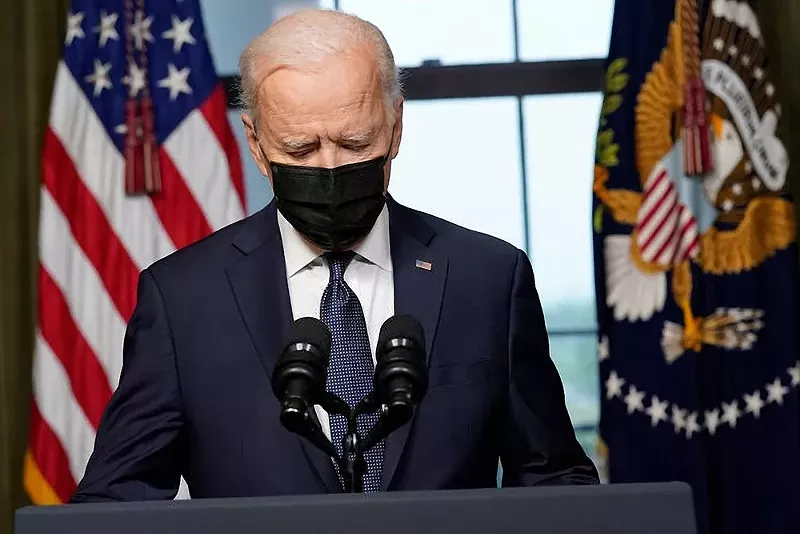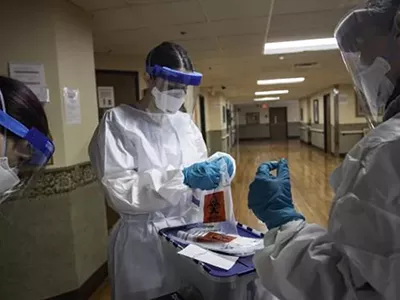
We’ve arrived at the conclusion of our 2021 countdown, having explored the emergent threats to our democratic institutions and the stories that dogged the White House in the summer and fall. Our final segment is something of a catch-all, bouncing from hot-button civil rights issues to unknowns that might dominate 2022’s political conversations.
15. The end of Roe
We knew this was coming the moment Mitch McConnell rushed Amy Coney Barrett onto the Supreme Court: During oral arguments in December, in a case that originated in Mississippi, the Court’s far-right majority signaled their intent to eviscerate the right to abortion. The only question is whether the Court will abandon its longstanding fetal viability threshold or junk Roe v. Wade altogether — death by a thousand papercuts or death by an ax to the skull.
Either way, Roe is dead. If there was any doubt, consider the mental gymnastics the Court’s conservatives went through to allow Texas’ antiabortion law — another affront to Roe — to stand. (Raise your hand if you think they’ll allow California to ban assault weapons using legal trickery. Didn’t think so.) And if there’s any doubt that the Court’s conservatives are ideologically driven radicals, they’ll vanish this spring when the abortion ruling comes down.
That leaves a question for Democrats: Will they get over their tepidity about “politicizing” the judiciary and realize that’s already happened, or will they keep getting steamrolled?
16. The homicide spike
George Floyd’s murder last year provoked a long-overdue reckoning, with cities questioning the way their police departments were funded and held accountable. About half of the country’s largest cities reduced their police budgets — often by relatively small amounts, and usually in the context of broader pandemic-related budget cuts. Cities and states also imposed measures to scrutinize law enforcement behavior and moderate use-of-force policies.
And then, as suddenly as the police reform movement gathered momentum, that momentum collapsed. Some Democrats blamed Defund the Police activists for their unexpectedly poor showing in the 2020 elections. But the more immediate problem was the surge in homicides: a 30% increase in 2020, another 10% increase in 2021. It didn’t matter that the surge happened in cities that increased police funding the same as those that cut it, or that, other than homicides, crime rates have continued a decade-long trend. Police reform had to wait.
17. The killing of Andrew Brown Jr.
The morning after former Minneapolis Officer Derek Chauvin was convicted of murdering George Floyd, sheriff’s deputies in Elizabeth City, North Carolina, murdered Andrew Brown Jr., a 42-year-old Black man, shooting him five times from behind as he drove away. Except the district attorney in Pasquotank County tripped over himself to say Brown — who was unarmed — was using his car as a weapon and the deputies shot Brown in self-defense, so he wouldn’t prosecute them. He then presented body-cam footage that, well, showed the exact opposite.
Brown’s family has filed a $30 million lawsuit, and the FBI is reportedly investigating whether the sheriff’s office violated Brown’s rights by gunning him down from behind. Whatever comes of those things, the fact remains that the justice George Floyd received is the exception, not the rule.
18. Gerrymandering
A key component of the stalled For the People Act was an attempt to ban political gerrymandering, which could be the means by which Republicans seize control of the U.S. House in November even if the expected red wave fails to materialize. Or maybe not, if court fights over Republican-drawn districts in Ohio and North Carolina go the Democrats’ way and New York Dems pull off a hardcore gerrymander of their own.
The issue isn’t — or shouldn’t be — which party gerrymandering helps. It’s that thanks to technological advances, lawmakers can now select their voters with mathematical precision, rather than the other way around, and the results of most elections are foregone conclusions before the first ballot is cast. That’s no way to run a healthy democracy.
19. Student loan debt
On May. 1, Joe Biden — who promised to forgive at least $10,000 in student loan debt — will allow federal student loan payments to resume nearly two years after they paused under Donald Trump. That’s a hell of a message to campaign on.
By resuming the payments, the White House hopes the signal that the economy is back on solid ground. For borrowers who collectively owe $1.6 trillion, that perception isn’t likely to be their number-one concern. Biden says he’d sign a bill to forgive student loan debt if Congress passed one, which it won’t. His Department of Education is still reviewing whether he has the authority to forgive debt unilaterally, which might be one way to mitigate the political damage with young voters.
20. The Trump investigations
A House committee is investigating the Jan. 6 insurrection — including White House officials’ role in coordinating and fomenting the attack — and Trump is suing to block the release of potentially damning records. New York is investigating Donald Trump’s business practices, and he’s suing to shut down that probe, too. A Georgia prosecutor is investigating whether Trump’s phone call to the secretary of state demanding that he “find” additional votes crossed a legal line. Trump is also facing lawsuits from Capitol Police officers and lawmakers over the Jan. 6 violence, and a defamation lawsuit stemming from sexual assault allegations.
Who knows what any of these will amount to, but they’ll keep Trump in the news. On the one hand, claims of martyrdom will only further endear him to his devotees. On the other, it’s hard to run a presidential campaign while fighting a felony rap.
21. The Omicron wave
We’ll end on the biggest question mark of 2022: How bad will the hyper-transmissible Omicron variant be? We know the wave is coming. We know it will tear through unvaccinated areas, though vaccinated people are still susceptible, especially those without boosters. But will it kneecap the economic recovery? Will it lead to new pandemic restrictions? Will it fill emergency rooms (or morgues) for weeks on end?
Or will it finally persuade the vaccine-resistant to get with the program?
Get Informed Dissent delivered to your inbox: billman.substack.com.
Stay connected with Detroit Metro Times. Subscribe to our newsletters, and follow us on Google News, Apple News, Twitter, Facebook, Instagram, or Reddit.







